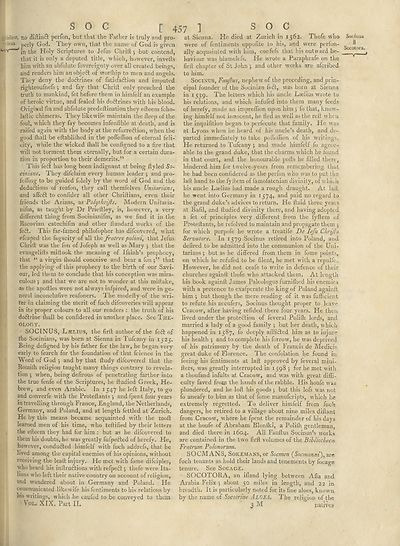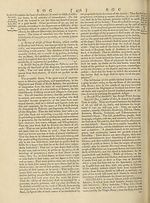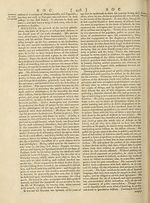Encyclopaedia Britannica, or, a Dictionary of arts, sciences, and miscellaneous literature : enlarged and improved. Illustrated with nearly six hundred engravings > Volume 19, Scripture-SUG
(503) Page 457
Download files
Complete book:
Individual page:
Thumbnail gallery: Grid view | List view

:: nn'
•inns.
S 0 C _ [ 457 3
ns, no diftincl perfon., but that the Father is truly and pro- at Sienna,
perly God. They own, that the name of God is given
in the Holy Scriptures to Jefus Chrift j but contend,
that it is only a deputed title, which, however, invefts
him with an abfolute fovereignty over all created beings,
and renders him anobjeft of worfhip to men and angels.
They deny the doftrines of fatisfaftion and imputed
tighteoufnefs •, and fay that Chrill only preached the
truth to mankind, fet before them in himfelf an example
of heroic virtue, and fealed his doftrines with his blood.
Original fin and abfolute predeftination they efteem fcho-
laftic chimeras. They likewife maintain the deep of the
foul, which they fay becomes infenfible at death, and is
raifed again with the body at the refurredtion, when the
good fliall be eftabliihed in the pofleffion of eternal feli¬
city, while the wicked Iball be configned to a fire that
will not torment them eternally, but for a certain dura¬
tion in proportion to their demerits.”
This fe£t has long been indignant at being ftyled So-
cinians. They difclaim every human leader ; and pro-
fetfing to be guided folely by the word of God and the
deductions of reafon, they call themfelves Unitarians,
and a£Fe<t to confider all other Chriftians, even their
friends the Arians, as Polythei/is. Modern Unitaria-
nifm, as taught by Dr Prieftley, is, however, a very
different thing from Socinianifm, as we find it in the
Racovian catechifm and other ffandard works of the
left. This far-famed philofopher has difcovered, what
efcaped the fagacity of all the fratres poloni, that Jefus
Chritt was the fon of Jofeph as well as Mary ; that the
evangelifts miftook the meaning of Ifaiah’s prophecy,
that “ a virgin Ihould conceive and bear a fon that
the applying of this prophecy to the birth of our Savi¬
our, led them to conclude that his conception was mira¬
culous ; and that we are not to wonder at this miftake,
as the apoftles were not always infpired, and were in ge¬
neral inconclufive reafoners. The modefty of the wri¬
ter in claiming the merit of fuch difcoveries will appear
in its proper colours to all our readers : the truth of his
doftrine fliall be confidered in another place. See The¬
ology.
SOCINUS, L^lius, the firfl: author of the feft of
the Socinians, was born at Sienna in Tufcany in 1525.
Being defigned by his father for the law, he began very
early to fearch for the foundation of that fcience in the
w ord of God •, and by that ftudy dilcovered that the
Romifli religion taught many things contrary to revela¬
tion ; when, being defirous of penetrating farther into
the true fenfe of the Scriptures, he ftudied Greek, He¬
brew, and even Arabic. In 1547 he left Italy, to go
and converfe with the Proteflants •, and fpent four years
in travelling through France, England, the Netherlands,
Germany, and Poland, and at length fettled at Zurich.
He by this means became acquainted with the mofl:
learned men of his time, who teftified by their letters
the efteem they had for him : but as he difcovered to
them his doubts, he was greatly fufpefted of herefy. He,
however, condufted himfelf with fuch addrefs, that he
lived among the capital enemies of his opinions, without
receiving the leaft injury. He met with fome difciples,
who heard his inftruftions with refpeft ; thefe were Ita¬
lians who left their native country on account of religion,
and wandered about in Germany and Poland. He
communicated likewife his fentiments to his relations by
his writings, which he caufed to be conveyed to them
Vol. XIX. Part II.
s o c
He died at Zurich in 1562. Thofe who
were of fentiments oppofite to his, and W'ere perlon-
ally acquainted with him, confefs that his outward be¬
haviour was blamelefs. He wrote a Paraphrafe on the
firft chapter of St John ; and other works are afcribed
to him.
Socinus, Faujius, nephew of the preceding, and prin¬
cipal founder of the Socinian feft, was born at Sienna
in 1539. The letters which his uncle Laeiius wrote to
his relations, and which infufed into them many feeds
of herefy, made an impreflion upon him 5 fo that, know¬
ing himfelf not innocent, he fled as well as the reft when
the inquifition began to perfecute that family. He was
at Lyons when he heard of his uncle’s death, and de¬
parted immediately to take pofleftion of his writings.
He returned to Tufcany •, and made himfeli fo agree¬
able to the grand duke, that the charms which he found
in that court, and the honourable polls he filled there,
hindered him for twelve years from remembering that
he had been confidered as the perfon who was to put the
laft hand to the fyftemof famofatenian divinity, of which
his uncle Lselius had made a rough draught. At lait
he went into Germany in 1574, and paid no regard to
the grand duke’s advices to return. He ftaid three years
at Bafil, and ftudied divinity there, and having adopted
a fet of principles very different from the fyftem of
Ptoteftants, he refolved to maintain and propagate them j
for which purpofe he wrote a treatife Dc lefu Chrijlo
Servatore. In 1579 Socinus retired into Poland, and
defired to be admitted into the communion of the Uni¬
tarians ; but as he differed from them in fome points,
on which he refufed to be filent, he met with a repulfc.
However, he did not ceafe to write in defence of their
churches againft thofe who attacked them. At length
his book againft James Paleologus furnifhed his enemies
with a pretence to exafperate the king of Poland againll
him j but though the mere reading of it was fufficient
to refute his accufers, Socinus thought proper to leave
Cracow, after having refided there four years. He then
lived under the proteftion of feveral Polifh lords, and
married a lady of a good family ; but her death, which
happened in 1587, fo deeply afflifted him as to injure
his health $ and to complete his forrow, he was deprived
of his patrimony by the death of Francis de Medicis
great duke of Florence. The confolation be found in
feeing his fentiments at laft approved by feveral mini-
fters, was greatly interrupted in 1598 5 for he met with
a thoufand infults at Cracow, and w'as with great diffi¬
culty faved from the hands of the rabble. His houfe was
plundered, and he loft his goods 5 but this lofs was not
fo uneafy to him as that of fome manuicripts, which he
extremely regretted. To deliver himfelf from fuch
dangers, he retired to a village about nine miles diftant
from Cracow, where he fpent the remainder of his days
at the houfe of Abraham Blonlki, a Polilh gentleman,
and died there in 1604. All Fauftus Socinus’s works
are contained in the two firfl; volumes of the Bibliotheca
Fratrum Polonorum.
SOCMANS, Sokemans, or Socmen {Socmanni'), are
fuch tenants as hold their lands and tenements by focage
tenure. See SoCAGE.
• SOCOTORA, an ifland lying between Alia and
Arabia Felix ; about 50 miles in length, and 22 in
breadth. It is particularly noted for its fine aloes, known
by the name of Socotrine ALOES. The religion of the
3 M natives
Socinui
Socotora.
•inns.
S 0 C _ [ 457 3
ns, no diftincl perfon., but that the Father is truly and pro- at Sienna,
perly God. They own, that the name of God is given
in the Holy Scriptures to Jefus Chrift j but contend,
that it is only a deputed title, which, however, invefts
him with an abfolute fovereignty over all created beings,
and renders him anobjeft of worfhip to men and angels.
They deny the doftrines of fatisfaftion and imputed
tighteoufnefs •, and fay that Chrill only preached the
truth to mankind, fet before them in himfelf an example
of heroic virtue, and fealed his doftrines with his blood.
Original fin and abfolute predeftination they efteem fcho-
laftic chimeras. They likewife maintain the deep of the
foul, which they fay becomes infenfible at death, and is
raifed again with the body at the refurredtion, when the
good fliall be eftabliihed in the pofleffion of eternal feli¬
city, while the wicked Iball be configned to a fire that
will not torment them eternally, but for a certain dura¬
tion in proportion to their demerits.”
This fe£t has long been indignant at being ftyled So-
cinians. They difclaim every human leader ; and pro-
fetfing to be guided folely by the word of God and the
deductions of reafon, they call themfelves Unitarians,
and a£Fe<t to confider all other Chriftians, even their
friends the Arians, as Polythei/is. Modern Unitaria-
nifm, as taught by Dr Prieftley, is, however, a very
different thing from Socinianifm, as we find it in the
Racovian catechifm and other ffandard works of the
left. This far-famed philofopher has difcovered, what
efcaped the fagacity of all the fratres poloni, that Jefus
Chritt was the fon of Jofeph as well as Mary ; that the
evangelifts miftook the meaning of Ifaiah’s prophecy,
that “ a virgin Ihould conceive and bear a fon that
the applying of this prophecy to the birth of our Savi¬
our, led them to conclude that his conception was mira¬
culous ; and that we are not to wonder at this miftake,
as the apoftles were not always infpired, and were in ge¬
neral inconclufive reafoners. The modefty of the wri¬
ter in claiming the merit of fuch difcoveries will appear
in its proper colours to all our readers : the truth of his
doftrine fliall be confidered in another place. See The¬
ology.
SOCINUS, L^lius, the firfl: author of the feft of
the Socinians, was born at Sienna in Tufcany in 1525.
Being defigned by his father for the law, he began very
early to fearch for the foundation of that fcience in the
w ord of God •, and by that ftudy dilcovered that the
Romifli religion taught many things contrary to revela¬
tion ; when, being defirous of penetrating farther into
the true fenfe of the Scriptures, he ftudied Greek, He¬
brew, and even Arabic. In 1547 he left Italy, to go
and converfe with the Proteflants •, and fpent four years
in travelling through France, England, the Netherlands,
Germany, and Poland, and at length fettled at Zurich.
He by this means became acquainted with the mofl:
learned men of his time, who teftified by their letters
the efteem they had for him : but as he difcovered to
them his doubts, he was greatly fufpefted of herefy. He,
however, condufted himfelf with fuch addrefs, that he
lived among the capital enemies of his opinions, without
receiving the leaft injury. He met with fome difciples,
who heard his inftruftions with refpeft ; thefe were Ita¬
lians who left their native country on account of religion,
and wandered about in Germany and Poland. He
communicated likewife his fentiments to his relations by
his writings, which he caufed to be conveyed to them
Vol. XIX. Part II.
s o c
He died at Zurich in 1562. Thofe who
were of fentiments oppofite to his, and W'ere perlon-
ally acquainted with him, confefs that his outward be¬
haviour was blamelefs. He wrote a Paraphrafe on the
firft chapter of St John ; and other works are afcribed
to him.
Socinus, Faujius, nephew of the preceding, and prin¬
cipal founder of the Socinian feft, was born at Sienna
in 1539. The letters which his uncle Laeiius wrote to
his relations, and which infufed into them many feeds
of herefy, made an impreflion upon him 5 fo that, know¬
ing himfelf not innocent, he fled as well as the reft when
the inquifition began to perfecute that family. He was
at Lyons when he heard of his uncle’s death, and de¬
parted immediately to take pofleftion of his writings.
He returned to Tufcany •, and made himfeli fo agree¬
able to the grand duke, that the charms which he found
in that court, and the honourable polls he filled there,
hindered him for twelve years from remembering that
he had been confidered as the perfon who was to put the
laft hand to the fyftemof famofatenian divinity, of which
his uncle Lselius had made a rough draught. At lait
he went into Germany in 1574, and paid no regard to
the grand duke’s advices to return. He ftaid three years
at Bafil, and ftudied divinity there, and having adopted
a fet of principles very different from the fyftem of
Ptoteftants, he refolved to maintain and propagate them j
for which purpofe he wrote a treatife Dc lefu Chrijlo
Servatore. In 1579 Socinus retired into Poland, and
defired to be admitted into the communion of the Uni¬
tarians ; but as he differed from them in fome points,
on which he refufed to be filent, he met with a repulfc.
However, he did not ceafe to write in defence of their
churches againft thofe who attacked them. At length
his book againft James Paleologus furnifhed his enemies
with a pretence to exafperate the king of Poland againll
him j but though the mere reading of it was fufficient
to refute his accufers, Socinus thought proper to leave
Cracow, after having refided there four years. He then
lived under the proteftion of feveral Polifh lords, and
married a lady of a good family ; but her death, which
happened in 1587, fo deeply afflifted him as to injure
his health $ and to complete his forrow, he was deprived
of his patrimony by the death of Francis de Medicis
great duke of Florence. The confolation be found in
feeing his fentiments at laft approved by feveral mini-
fters, was greatly interrupted in 1598 5 for he met with
a thoufand infults at Cracow, and w'as with great diffi¬
culty faved from the hands of the rabble. His houfe was
plundered, and he loft his goods 5 but this lofs was not
fo uneafy to him as that of fome manuicripts, which he
extremely regretted. To deliver himfelf from fuch
dangers, he retired to a village about nine miles diftant
from Cracow, where he fpent the remainder of his days
at the houfe of Abraham Blonlki, a Polilh gentleman,
and died there in 1604. All Fauftus Socinus’s works
are contained in the two firfl; volumes of the Bibliotheca
Fratrum Polonorum.
SOCMANS, Sokemans, or Socmen {Socmanni'), are
fuch tenants as hold their lands and tenements by focage
tenure. See SoCAGE.
• SOCOTORA, an ifland lying between Alia and
Arabia Felix ; about 50 miles in length, and 22 in
breadth. It is particularly noted for its fine aloes, known
by the name of Socotrine ALOES. The religion of the
3 M natives
Socinui
Socotora.
Set display mode to:
![]() Universal Viewer |
Universal Viewer | ![]() Mirador |
Large image | Transcription
Mirador |
Large image | Transcription
Images and transcriptions on this page, including medium image downloads, may be used under the Creative Commons Attribution 4.0 International Licence unless otherwise stated. ![]()
| Permanent URL | https://digital.nls.uk/192701821 |
|---|
| Attribution and copyright: |
|
|---|
| Description | Ten editions of 'Encyclopaedia Britannica', issued from 1768-1903, in 231 volumes. Originally issued in 100 weekly parts (3 volumes) between 1768 and 1771 by publishers: Colin Macfarquhar and Andrew Bell (Edinburgh); editor: William Smellie: engraver: Andrew Bell. Expanded editions in the 19th century featured more volumes and contributions from leading experts in their fields. Managed and published in Edinburgh up to the 9th edition (25 volumes, from 1875-1889); the 10th edition (1902-1903) re-issued the 9th edition, with 11 supplementary volumes. |
|---|---|
| Additional NLS resources: |
|

